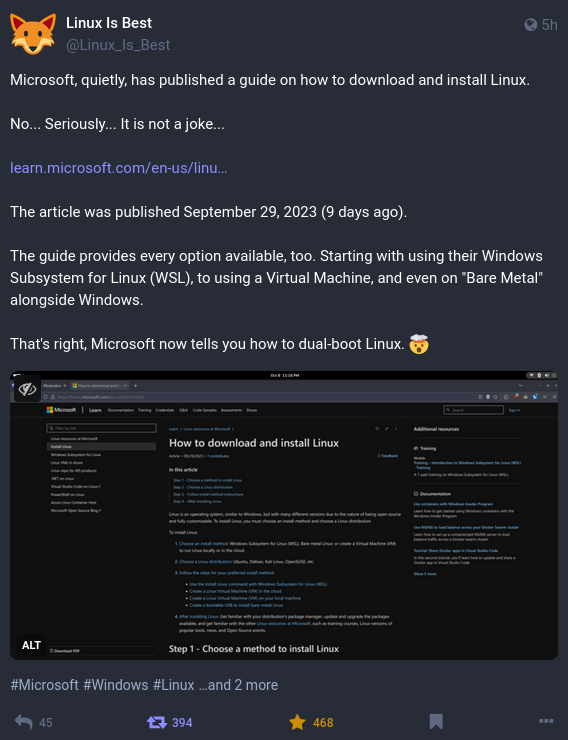why not? it's not like there is any competition.
Microsoft is making more money off Linux with Azure than several red hats combined.
Linux
From Wikipedia, the free encyclopedia
Linux is a family of open source Unix-like operating systems based on the Linux kernel, an operating system kernel first released on September 17, 1991 by Linus Torvalds. Linux is typically packaged in a Linux distribution (or distro for short).
Distributions include the Linux kernel and supporting system software and libraries, many of which are provided by the GNU Project. Many Linux distributions use the word "Linux" in their name, but the Free Software Foundation uses the name GNU/Linux to emphasize the importance of GNU software, causing some controversy.
Rules
- Posts must be relevant to operating systems running the Linux kernel. GNU/Linux or otherwise.
- No misinformation
- No NSFW content
- No hate speech, bigotry, etc
Related Communities
Community icon by Alpár-Etele Méder, licensed under CC BY 3.0
Yes, but people find this interesting because historically, Microsoft was actively trying to destroy Linux (look up Halloween documents) and even said that Linux is cancer.
A lot changed after Satya Nadella took the helm. The modern .NET platform is really quite nice, and MS does a lot of ~~FOSS~~ open source work.
Obviously it’s good to be sceptical, they’re a large corporation and all they want is money, they’re not our friends. They’re just not as draconian as they were in the 90s and the 00s.
Usually FOSS is specifically copyleft licences like the GPL, which Microsoft don't use. Their open-source stuff tends to be MIT.
While you're correct, that's funny because as a developer using a framework like dotNET, MIT gives YOU more freedom. At least for anything statically linked where the GPL code would end up as part of your binary and force you to GPL your own code I believe.
MIT gives YOU more freedom
After years of debate about licenses for my own software (that only I use...), my philosophy has been boiled down to this: MIT for libraries. GPL for programs.
This way, other developers can freely use your library, and your program remains free.
Huh? FSF counts the MIT license as free, though they call it the Expat license they list it as both Free and GPL compatible: https://www.gnu.org/licenses/license-list.html#Expat It is also listed as an opensource licence by the OSI.
Thus by definition MIT is a FOSS licence.
Windows: What is my purpose?
User: You are a bootloader to install Linux.
Oh my god
While I see an extensive amount of "Embrace, Extend, Extinguish" and do agree that this is the typical logic of Microsoft.
It's obvious this is to try and avoid getting hit with similar monopoly accusations that their competitors are receiving.
"Look, Look!! We support other Operating Systems! We have a guide! We're not a monopoly! See, See!!"
This has way more to do with Azure is their main product and they know what people want to run on the cloud runs on Linux workloads. They've seen their Kuberbetes numbers, they know where the money is
I'm reminded of Google's financial support for Firefox, so as to dissuade the idea that they are a monopoly
In exchange, FF uses Google search by default. So they're also getting direct value from the deal.
I love when people on the Internet say "X did Y quietly" to make it more suspenseful. This doesn't look quiet to me...
Microsoft must make 40% of their revenue off of Azure at this point. I would not be surprised if more than 50% of that is on Linux. Windows is probably down to 10% ( around the same as gaming ).
https://www.kamilfranek.com/microsoft-revenue-breakdown/
Sure there are people in the Windows division who want to kill Linux and some dev dev folks will still prefer Windows. At this point though, a huge chunk of Microsoft could not care less about Windows and may actually prefer Linux. Linux is certainly a better place for K8S and OCI stuff. All the GPT and Cognitive Services stuff is likely more Linux than not.
Do people not know that Microsoft has their own Linux distro? I mean an installation guide is not exactly their biggest move in Linux?
I have one dream for Linux. I'm a huge OSS fan and I want to see it thrive.
I think Microsoft should partner with Oracle to make Oracle Linux 9 support all the Microsoft ecosystem. I want AD in Linux. I want Microsoft Word on Linux. Oracle Linux 9 is the obvious successor to RHEL and Microsoft has an opportunity here to build something great.
Lmao just kidding
I was about 90% reading this going wtf is this guy on?
You got me, I had my torch and pitchfork ready and my FOSS-themed chanting was growing louder...
So the Embrace-Extend-Extinguish continues....
They're having issues with step 3 on Linux
My perspective is that it's there so it shows up on search results for "installing Linux" and recommends WSL over bare metal. At least that's how I understand the wording.
But who knows.
This is a thing about huge companies. They can only ignore alternatives at their own peril.
The Windows team probably prefers you don't ever install Linux even though they wised up and created WSL (so they don't lose developers to Linux desktop the way they lost creative designers to Mac).
The other teams? VSCode, Office 365, Azure, GitHub, Bing, Skype, etc wisely DGAF what your OS is - just that it's supported so you can use it.
Great! Then now you're ready to install Microsoft Edge on your fresh new linux installation: https://packages.microsoft.com/repos/edge/pool/main/m/microsoft-edge-stable/ 🤡
It comes with bing search pre configured for you so you don't have to look for the settings, we also hid them so you don't accidentally switch to duckduckgo because we believe Linux users shall experience the full potential of our services even out abroad on another OS
You could not live with your own OS. Where did that bring you?
 Back to me
Back to me
The thing is, I don't think a guide is really needed to install Linux. Most of it is pretty straight-forward. (The only tricky bit that comes to mind is making the USB that you've put your distro on bootable. That probably isn't obvious; and it might not be obvious how to get your computer to boot from a USB anyway if you've never done it before.)
Anyway, the way I see it, Microsoft's guide is more about how you can use Linux while still having Windows. If someone is searching for "how do I install Linux?" Microsoft would obviously prefer the answer to involve something that preserves Windows. First preference: WSL, second preference: Virtual Machine, third preference: dual-boot. And after that, you're on your own.
Why wouldn't they? Windows 10+ is a great development machine and Microsoft knows that a lot of developers develop with Linux. WSL is great for all parties - including Linux
I, too, have had the audacity to say WSL is useful on this community and it was also met with down votes. Purists hating and gate keeping, and then they wonder why Linux isn't more popular.
Link to post: https://mastodon.social/@Linux_Is_Best/111202901396633888 Link to Microsoft guide : https://learn.microsoft.com/en-us/linux/install
Embrace, extend, and extinguish
It makes sense for Microsoft to support Linux though...
They tried their hardest to kill Linux under Steve Ballmer but now they're moving (or in reality have moved) to a model where Xbox and cloud are their main income-generating industries. The former is unrelated to Windows/Linux and the latter is frankly more dependant on Linux than it is on Windows - Microsoft have been supportive of Linux through Azure for years now and it doesn't exactly make sense for them to be developing two different operating systems, so it's not far fetched to imagine they'll drop ~~DOS~~ NT as a backend for windows entirely in the future and move to a Linux backend, with Windows just being a closed source DM with tracking etc added on.
This covers embrace & extend, but I don't think the extinguish part makes sense - sure they may add features the FOSS community disagree with, but at worst we're in a similar position to where we are now with things being released separately for Linux and Windows
I mean, why not do that, from their perspective. Linux has been around for a long time and Windows still maintains market share. They don't feel threatened at this point, so might as well have the explanation of how to install Linux be a subtle ad for Windows.
To be fair, WSL2 is actually a pretty decent system if you still need to have Windows installed for one reason or another.
Another thing they have "slipped" in recently is Linux (only Ubuntu for now) support in Microsoft Intune.
This change will make it possible to run Linux in a Microsoft cloud/azure workplace.
Let me just check out the window real quick. There may be flying pigs.
Can't wait for this page to become a Rickroll for Linux community giving technical advice.
